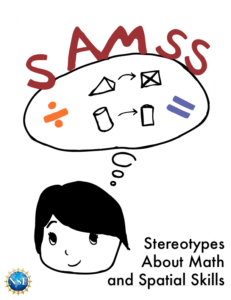Projects In Our Lab
How do children feel about math and space?
As early as 1st or 2nd grade, girls report feeling higher anxiety when performing math than boys and both boys and girls start to think of math as “for boys”. This is surprising, especially since there is no evidence that boys and girls perform differently in math classes. We have found a similar pattern in the domain of space — girls report higher anxiety about performing spatial tasks (e.g., building with blocks, reading a map) and associate spatial tasks with boys. It is possible that these early emerging gender differences in attitudes, explain why women are underrepresented in STEM later in life. Through behavioral studies with 4-10 year olds, our lab is interested in understanding when and why these gender differences emerge, and what we can do to reduce the perpetuation and impact of these stereotypes. This work is supported by a grant from the National Science Foundation.
How do early number concepts develop in deaf and hard of hearing (DHH) children?
DHH children tend to underperform on math tasks. We are motivated to understand why this is. Specifically, our lab is interested in exploring the role of language experience in emerging math abilities by assessing counting, number word comprehension, and proportional reasoning in DHH children and their hearing peers. Additionally, we are interested in gauging the influence language experience has on nonsymbolic number abilities such as estimation and numerical discrimination. We are honored to work with and have support from many families, hospitals, and schools for deaf and hard-of-hearing children in our effort to understand numerical cognition in deaf and hard of hearing children. This work is supported by a grant from the National Science Foundation.
How do children and adults think about rational numbers?
How do children decide that 1/2 is smaller than 3/4? Do children and adults approach this question differently if the numbers are in decimal notation: 0.5 vs. 0.75? Using behavioral tasks and eye-tracking techniques, we are investigating how children think about the magnitudes values associated with decimal and fractional notation, as well as the relationship between this magnitude understanding and Algebra or pre-Algebra understanding.
How do children’s developing sense of number relate to their prosocial abilities?
One of the most important human achievements is our ability to be generous to others. We know that many sub-components of generosity (sharing, cooperation, prosocial behavior, empathy) develop rapidly during the period of early childhood, at the same time that children are learning to count. Through a grant funded by the National Science Foundation, we are investigating the intersection of prosocial development and numerical abilities in young children. To learn more about this research, please visit Count on Sharing.
How is Theory of Mind related to language experience?
Theory of Mind (ToM) is the understanding that others have thoughts, feelings, and beliefs that are different from one’s own. This is an important social ability that has been linked to social success. Studies suggest that many deaf and hard of hearing children lag behind hearing peers in this ability. We are currently employing nonverbal ToM tasks explore the root of these apparent challenges in order to assess the potential implications for prosocial development.
